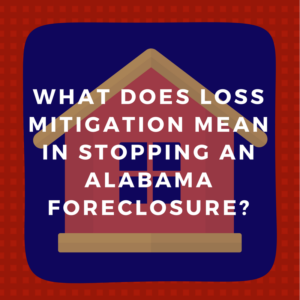What does loss mitigation mean in stopping an Alabama foreclosure?
 If you are remotely facing an Alabama foreclosure, you need to look at loss mitigation.
If you are remotely facing an Alabama foreclosure, you need to look at loss mitigation.
Let’s talk about loss mitigation as follows:
- What is loss mitigation?
- What are examples of loss mitigation
- When do I need to apply for loss mitigation?
- What happens if the mortgage company refuses to give me loss mitigation?
- What should I do now?
Let’s go through each one of these.
What is loss mitigation?
This simply means something to avoid the foreclosure.
“Mitigation” means to lessen something negative.
So in a personal injury context we talk about “mitigating” your damages. It means you get the medical treatment you need. You do the therapy you need to get back to 100% physical recovery.
In a foreclosure context, it means to stop or prevent a foreclosure. And this is something you do working hand in hand with your mortgage company.
What are some examples of loss mitigation?
Here are the more common examples:
- Loan modification
- Short sale
- Deed in lieu of foreclosure
“Loan Modification” is where your mortgage loan is modified. Maybe you are behind $10,000 and that “arrearage” is put on the end of the loan. Your interest rate is reduced or the term of the loan is extended. Bottom line is a change is made to your loan so you are no longer facing foreclosure.
“Short Sale” is where you are selling your home but it will be sold for less than what you owe on the first mortgage. So let’s say you owe $350,000 but you can only sell your house for $310,000. You are $40,000 short.
Either you must take $40,000 to the closing table or you must get your mortgage company to agree to let you be short. (An issue comes up how will this be credit reported, tax consequences, and whether you can be sued for the “shortage” but that’s not our focus in this article).
“Deed In Lieu Of Foreclosure” is where you give the deed to your home to the mortgage company. The deed is the ownership. So you give it instead of (in lieu of) a foreclosure. You might think of this being similar to a voluntarily turning in of a vehicle instead of a repossession. This avoids a foreclosure against you and saves the mortgage company the effort of foreclosing. (Like a short sale, you need to understand credit reporting and whether you can be sued for any deficiency as well as tax consequences).
When do I need to apply for loss mitigation?
As soon as possible. As soon as you sense you are starting to fall behind.
Certainly, before you get a default letter — at that point foreclosure is very soon.
Better too early (if there is such a thing) than too late.
And if your mortgage company tells you that you have applied too early, ask them when you should re-apply and document every conversation.
What happens if the mortgage company refuses to give me loss mitigation?
Ask “Why” — over and over.
Get every detail on what went wrong.
Here are some possibilities:
- Documents are missing
- Documents received too late
- Follow up is needed for documents or information
- Applied too early
- Applied too late
- Some other reason
Once you know the reason, say “How can I fix this?”
See what the mortgage company says.
Regardless, ask yourself this question also.
Figure out anything you can do to fix the problem — whether it is a real problem or a made up one by your mortgage company.
What should I do now?
You have two options basically.
Either do this on your own or get some help.
If you do it on your own, make sure you know all the rules and document every single thing. Assume your mortgage company will lie to you. Protect yourself.
Or get with a foreclosure defense lawyer who is experienced dealing with fighting mortgage companies. Not simply someone who knows how to file bankruptcy. But the one who understands how mortgage companies work. How to avoid a lawsuit but if a lawsuit is needed, someone who will fight the mortgage company directly.
If you are in Alabama, give us a call at 205-879-2447. Ask to speak to Randi and she’ll get started understanding your situation so we can give you our evaluation of your options.
Or you can reach us through our contact page if you want to send us a message.
Thanks and we look forward to hearing from you.
PS — if you want to read some more you might find these articles interesting:
Secret your mortgage company does not want you to know about stopping your foreclosure
How do I find the right Alabama foreclosure defense lawyer
Learn the types of Alabama foreclosure defense cases we will not take
Foreclosure case study — bankruptcy or suing your mortgage company